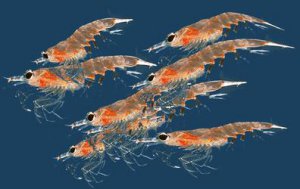Krill Oil
What Is Krill?
Krill oil is an extract prepared from krill. It’s a rich source of omega-3 fatty acids, especially EPA and DHA, bound mostly to phospholipids.[1] It’s also a natural source of the antioxidant astaxanthin.[2]
How Does Your Body Use It?
Omega-3 fatty acids are essential to human metabolism.[3] Dating back to the early 1970’s, researchers have found reason to believe that Omega-3 fatty acids may help in warding off the autoimmune response and inflammation in the body, while lowering the risk of chronic diseases (e.g., heart disease, cancer, arthritis, diabetes, hypertension).[4] In addition, Omega-3s enhance blood flow and cognitive/behavioral functioning (e.g., benefitting children with learning disabilities, reducing violence in prison inmates, enhancing mood and preventing neurological disorders).[5]
 Astaxanthin is another important component of krill oil, and has been shown to be a very powerful antioxidant with multiple potential health benefits of its own.[6] Its ability to pass the blood/brain barrier and deliver benefits directly to the brain has led some scientists to refer to it as “a potent candidate for brain food.”[7]
Astaxanthin is another important component of krill oil, and has been shown to be a very powerful antioxidant with multiple potential health benefits of its own.[6] Its ability to pass the blood/brain barrier and deliver benefits directly to the brain has led some scientists to refer to it as “a potent candidate for brain food.”[7]
Why People Take It
Omega-3 fatty acids are commonly suggested to help improve cardiovascular health.[8] In the case of krill oil specifically, studies have suggested that the phospholipid content enables greater absorption and utilization of Omega-3’s,[9] and that lower doses are as effective due to this difference.[10]
The reason for this advantage is thought to be the structure of human cells themselves, since cell walls are also phospholipids. The Omega-3s in fish oil, by contrast, are bound to triglycerides.
Many consumers also choose krill oil over fish oil because the pills themselves are generally smaller and easier to swallow, and lack some of the unpleasant side effects fish oil is known for such as “fish burps.” This is often attributed to the astaxanthin content of krill oil.
Krill oil has also been suggested to have positive impacts on cholesterol,[11] PMS,[12] arthritis,[13] and weight management.[14]
More information on potential Krill Oil Benefits.
Are There Negatives or Side Effects?
Since krill are crustaceans, those with seafood allergies are likely to have allergic reactions to krill oil supplements as well. It is not recommended for those on blood thinning products, as krill oil can also cause some blood thinning. For this reason, it’s not recommended to take krill oil prior to surgery.
How To Choose A Krill Oil Supplement
Since the main reason one would take krill oil is the Omega-3 content, it stands to reason that the amount of those nutrients are important in choosing a krill oil supplement. Quality krill oil should contain (per 1,000 mg dose):[15]
- 400mg or more phospholipids
- 300mg of Omega-3’s
- 150mg EPA
- 90mg DHA
- 1.5mg Astaxanthin
Delivery method – some manufacturers have claimed a new type of capsule, called a caplique, provides superior nutrient delivery. However, no evidence to support this claim can be found at this time. There is some concern that the method of sealing capliques (a band is placed around the seam of a capsule and possibly heat-sealed) could actually contribute to oxidation of the krill oil.
Conclusion … capliques are [at best] not superior to traditional softgels, and possibly even inferior.
Extraction method – as demand for krill oil has grown, manufacturers have experimented with krill extraction methods that can be used in mass-production processes. Most are now using solvent-based extraction methods, which inevitably leave traces of solvent in the final product. This method has also been found to retain less nutrients than previously used methods[16] , leading some manufacturers to further alter the natural product in order to retain desired nutrient levels.
Conclusion … evidence would suggest solvent based extraction to be an inferior method, and supplements using this method less desirable.
Overall Freshness – Some studies have suggested that the nutrient levels in krill oil can deteriorate over time.[17] However, current mass-production methods have led to widespread delays in processing extracted oil. In other words, once extracted krill oil can sit for months before being encapsulated and bottled, creating the potential for oxidation and the loss of valuable nutrients.
Conclusion … fresher krill oil should be chosen whenever possible.
An ideal krill oil supplement will meet all of these criteria. For more information on choosing a krill oil supplement, see our Krill Oil Product Recommendations.
See Also:
- Krill Oil Product Recommendations
- Krill Oil Extraction Methods
- Krill Oil — How to Choose?
- Krill Oil Benefits
- Omega-3 Fatty Acids
- ^ “Krill oil. Monograph”. Altern Med Rev. 15 (1): 84–6. 2010. PMID 20359272
- ^ Ali-Nehari, Abdelkader; Kim, Seon-Bong; Lee, Yang-Bong; Lee, Hye-youn; Chun, Byung-Soo (14 November 2011). “Characterization of oil including astaxanthin extracted from krill (Euphausia superba) using supercritical carbon dioxide and organic solvent as comparative method”. Korean Journal of Chemical Engineering. 29 (3): 329–336. doi:10.1007/s11814-011-0186-2.
- ^ “Omega-3 Fatty Acids and Health: Fact Sheet for Health Professionals”. US National Institutes of Health, Office of Dietary Supplements. 2005. Retrieved 12 April2014.
- ^ Simopoulos, Artemis P. “Omega-3 fatty acids in inflammation and autoimmune diseases.” Journal of the American College of Nutrition21.6 (2002): 495-505.
- ^ Simopoulos, Artemis P. “Omega-3 fatty acids in health and disease and in growth and development.” The American journal of clinical nutrition 54.3 (1991): 438-463.
- ^ Naguib, Yousry MA. “Antioxidant activities of astaxanthin and related carotenoids.” Journal of agricultural and food chemistry 48.4 (2000): 1150-1154.
- ^ Liu, Xuebo, and Toshihiko Osawa. “Astaxanthin protects neuronal cells against oxidative damage and is a potent candidate for brain food.” Food Factors for Health Promotion. Vol. 61. Karger Publishers, 2009. 129-135.
- ^ Kris-Etherton, Penny M., et al. “Fish consumption, fish oil, omega-3 fatty acids, and cardiovascular disease.” circulation 106.21 (2002): 2747-2757.
- ^ Amate, Laura, Angel Gil, and María Ramírez. “Feeding infant piglets formula with long-chain polyunsaturated fatty acids as triacylglycerols or phospholipids influences the distribution of these fatty acids in plasma lipoprotein fractions.” The Journal of nutrition 131.4 (2001): 1250-1255.
- ^ Ulven, Stine M., et al. “Metabolic effects of krill oil are essentially similar to those of fish oil but at lower dose of EPA and DHA, in healthy volunteers.” Lipids 46.1 (2011): 37-46.
- ^ Bunea, Ruxandra, Khassan El Farrah, and Luisa Deutsch. “Evaluation of the effects of Neptune Krill Oil on the clinical course of hyperlipidemia.” Altern Med Rev 9.4 (2004): 420-428.
- ^ Sampalis, Fotini, et al. “Evaluation of the effects of Neptune Krill Oil™ on the management of premenstrual syndrome and dysmenorrhea.” Alternative medicine review 8.2 (2003): 171-179.
- ^ Ierna, Michelle, et al. “Supplementation of diet with krill oil protects against experimental rheumatoid arthritis.” BMC musculoskeletal disorders 11.1 (2010): 1.
- ^ Ferramosca, A., L. Conte, and V. Zara. “A krill oil supplemented diet reduces the activities of the mitochondrial tricarboxylate carrier and of the cytosolic lipogenic enzymes in rats.” Journal of animal physiology and animal nutrition 96.2 (2012): 295-306.
- ^ “Krill oil. Monograph”. Altern Med Rev. 15 (1): 84–6. 2010. PMID 20359272
- ^ Gigliotti, Joseph C., et al. “Extraction and characterisation of lipids from Antarctic krill (Euphausia superba).” Food Chemistry 125.3 (2011): 1028-1036.
- ^ Bustos, Rubén, et al. “Oxidative stability of carotenoid pigments and polyunsaturated fatty acids in microparticulate diets containing krill oil for nutrition of marine fish larvae.” Journal of Food Engineering 56.2 (2003): 289-293.
